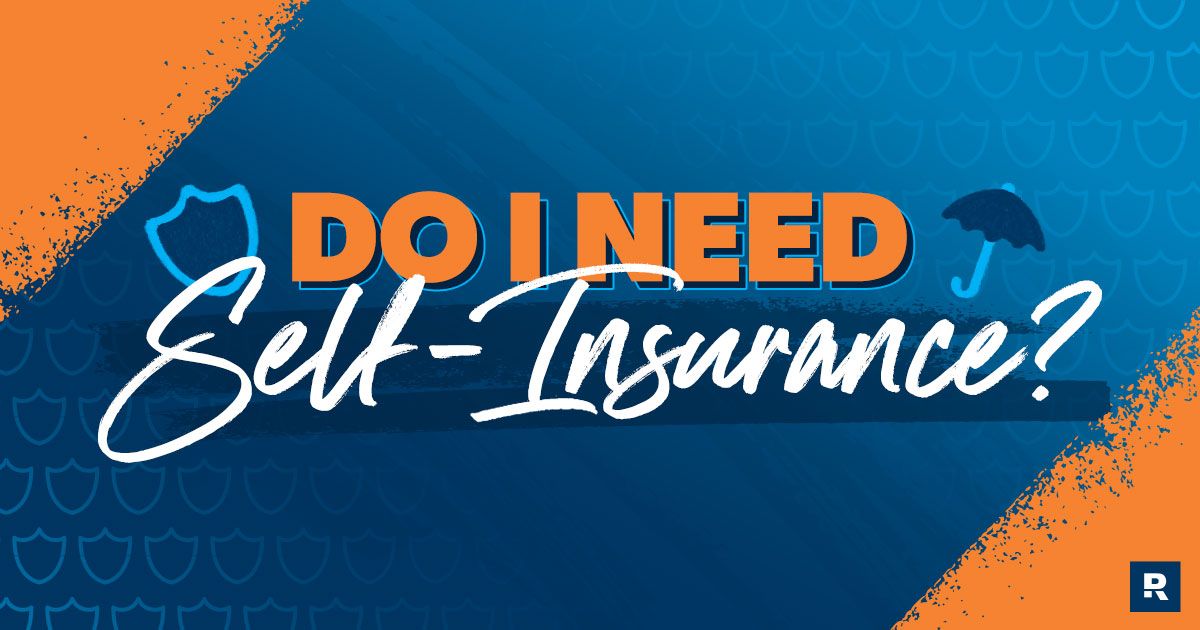Self-Insurance: How It Works and When You Need It
8 Min Read | Feb 13, 2025

Do you ever feel like the journey to cover all of your insurance needs never ends? What with needing a policy for your home, your health, your car, your life—and several more—just listing them off is kind of exhausting!
But here’s something to make you feel better: Did you know you could be your own insurance provider by becoming self-insured? In some cases, yes! No more unnecessary insurance premiums—just you, your savings and investments, and a whole lot of peace of mind.
So, how do you get to be self-insured? And is self-insurance always a good solution for every insurance need? (Spoiler: No.)
Let’s dig in.
What Is Self-Insurance?
Being self-insured means you would have enough money to cover anything an insurance company would usually pay for. For many kinds of coverage—like health insurance and car insurance—being self-insured isn’t practical because the potential risk and cost for those events is way too high to pay out of pocket. (We’ll talk more about essential insurance types a little later.)
Compare Term Life Insurance Quotes
But there’s one coverage type—life insurance under very specific conditions—where being your own insurance provider makes a lot of sense! When you’re self-insured for life insurance, you have enough money on hand to take a pass on an insurance policy and enjoy some savings.
Does Self-Insurance Make Sense for the Self-Employed?
People sometimes confuse being self-employed with being self-insured. It’s understandable! The thinking seems to be, Hey, I’m self-employed now. Without employee benefits, I guess it’s up to me to cover every risk out of my own pocket.
Slow down there, entrepreneur. The terms may sound similar, but they’re not at all the same. And while being self-employed often means buying your own insurance (instead of getting coverage through your employee benefits), that’s quite different from having enough money to pay for every risk in life. For example, don’t confuse self-employed health insurance (which you definitely need) with “I’m self-employed, I can skip medical coverage.” That assumption could land you deep in medical debt, and potentially ruin your business and your finances.
Which Types of Insurance Should I Not Self-Insure?
These are the types of insurance you should always have in place:
Car Insurance
Car insurance is a mandatory requirement in pretty much every state. So, you’d be breaking the law if you didn’t have some kind of insurance for your car. But the main reason to have car insurance is to protect you if you’re in an accident and to protect your wallet if you’re faced with hefty legal costs from anyone who wants to sue you.
Home Insurance
Home insurance is important to have, but it’s hard to self-insure. The costs to repair or rebuild your home after a fire or flood would be through the roof! (Heh.) Your home is an asset—and one you want to protect with home insurance. And don’t forget: Lots of home insurance policies come with legal liability protection in case someone is injured in your home and decided to sue.
Health Insurance
Once upon a time, the The Affordable Care Act required everyone to have a certain level of health insurance coverage. That requirement is no longer in effect—but that’s no reason to skip health insurance. We’ll say this again to be sure you hear: Never self-insure for health insurance. You need health insurance, because if you need treatment for any major health issue (and sometimes even minor ones) the medical bills could very quickly become unaffordable without coverage.
When Should I Self-Insure?
We think you should always aim to self-insure your life insurance. Life insurance is there to replace your income if you die unexpectedly—and that’s its only job. Once you’re out of debt and investing like a pro, you can work your way to self-insuring your income. This one makes sense!
What Are the Benefits of Self-Insuring for Life Insurance?
If you can self-insure for life insurance, you’ll save money in several ways.
1. You’ll pay less in premiums every year.
If you’re self-insured, you’re not paying an insurance company every year to carry the risk of replacing your income if something happens to you. That’s a huge benefit to you because you’re saving money! And we’re all about saving money where we can—especially on insurance premiums.
2. You’ll have more money to invest.
Saving money on life insurance premiums means you have more money to put into investments. And if they’re good investments (like a mutual fund), then that’s even better!
3. You can raise your deductibles.
Being self-insured means you can feel confident about raising the deductibles on the insurance you can’t avoid, like your auto, home and health insurance. A higher deductible usually lowers your premium because you’re sharing more of the cost of any claims with your insurance company.
Got Kids? Use These 5 Tips to Get the Right Length of Life Insurance.
If you have kids depending on your income, you might be wondering, How long should my life insurance policy last? Great question!
How Does Self-Insured Life Insurance Work?
When it comes to life insurance, self-insured means having enough in investments to replace your income and provide for your loved ones after you’ve died. Your dependents won’t need to worry about paying bills, putting food on the table, or anything else they’ve depended on your income for.
Now, before we go any further, this is not about making them rich! Self-insurance is about you working to become your own insurance provider. How? Say you have a term life insurance policy (which is the only type of life insurance we recommend) that lasted 20 years.
If you work during those 20 years to pay off debt and build up your investments, then at the end of the term, you’d be debt-free and have enough in savings, investments and assets to ensure your family could live off the income they generate if you passed away. You wouldn’t need to pay for life insurance anymore because you’d be self-insured. Imagine how that would feel! Great, right?
Here’s how you’ll know you’ve reached the point of being self-insured. The debt-free part is obvious—no payments. (Yes, it’s an awesome way to live.) As for the income generated by your savings, investments and assets, you’ve got three (or maybe four) steps to see if you’re there.
- Write down your annual income.
- Take a look at how much ROI you’re currently getting on everything.
- If your ROI is beating your income, congrats! It’s time to kiss that life insurance policy goodbye. But . . .
- If your ROI is still falling short of your annual income, keep the policy in place until you reach that self-insured sweet spot.
But what does this look like with the numbers? Let’s look at some examples.
|
Annual income |
How much to aim for in savings/investments |
How much a 10% annual return will generate |
|
$50,000 |
$500,000 |
$50,000 |
Now, let’s look at someone whose income is higher.
|
Annual income |
How much to aim for in savings/investments |
How much a 10% annual return will generate |
|
$80,000 |
$800,000 |
$80,000 |
If those savings numbers fill you with panic, don’t worry—the stage of life your family is in makes a big difference in how much you need in order to become self-insured. If the kids have left home and no longer rely on your income (and you’re completely debt-free), then your spouse won’t need as much to get by.
Learn the Smarter Way to Do Life Insurance
Life insurance can feel freakin’ confusing. Sign up to get Ramsey’s no-nonsense advice, including free access to Dave’s video from Financial Peace University (normally $80), plus guides and resources sent right to your inbox.
When Should I Self-Insure for Life Insurance?
Like we said, the timing on this will depend on your own age and stage of life. Walley A., from our Ramsey Baby Steps Community Group, said it this way. “It’s not based on age. Once my wife and I were debt-free, and our children were grown and gone, we had built wealth and enough savings to pay cash for our final expenses. So we dropped our life insurance.” Hey Walley, that’s exactly how you do it!
Some people keep the life insurance longer even if they have plenty of savings, just because they like the extra protection! Tony H. was like that. “As we approached retirement, we had $350,000 on me and $100,000 on my wife. But even after we had enough to be self-insured, we held on to those policies for a couple of years. They were relatively inexpensive and provided a little more cushion.” Once Tony’s term ended, they canceled their policies. That’s another way to keep everyone covered!
And here’s what Pat W. told us about self-insured life on Baby Step 7 (the step when you have no debt, plenty in savings, and you’re living the dream). “Just canceled two life insurance policies. Self-insured now. BS7 rocks! Keep going, friends! It’s so worth it!” Let’s all follow in Pat’s footsteps!
Remember, you’re ready to be self-insured for your life insurance when you’re debt-free and have plenty in savings to cover your income year after year. For most people, that happens when they’re approaching retirement or when their term life insurance is coming to an end.
And if you’re not quite self-insured yet? A term life insurance plan lasting 15–20 years with coverage that’s 10–12 times your annual salary will provide the income protection you need while you work the Baby Steps. And your loved ones will be covered while you work your way to becoming self-insured!
Next Steps
- As you build up to self-insurance, follow our Baby Steps. They’re the proven plan millions have followed to get out of debt, save money, and build wealth for the future.
- Use our investment calculator to find out how much you need to save each month over time to replace your life insurance policy coverage and become self-insured.
- If you need term life insurance in the meantime, connect with RamseyTrusted partner Zander Insurance. They'll shop affordable rates from top insurance companies and send you a list of custom quotes to choose from.
Life Insurance Calculator
You can get an idea of how much you need (and save some brain calories while you’re at it) by using this quick life insurance calculator.



